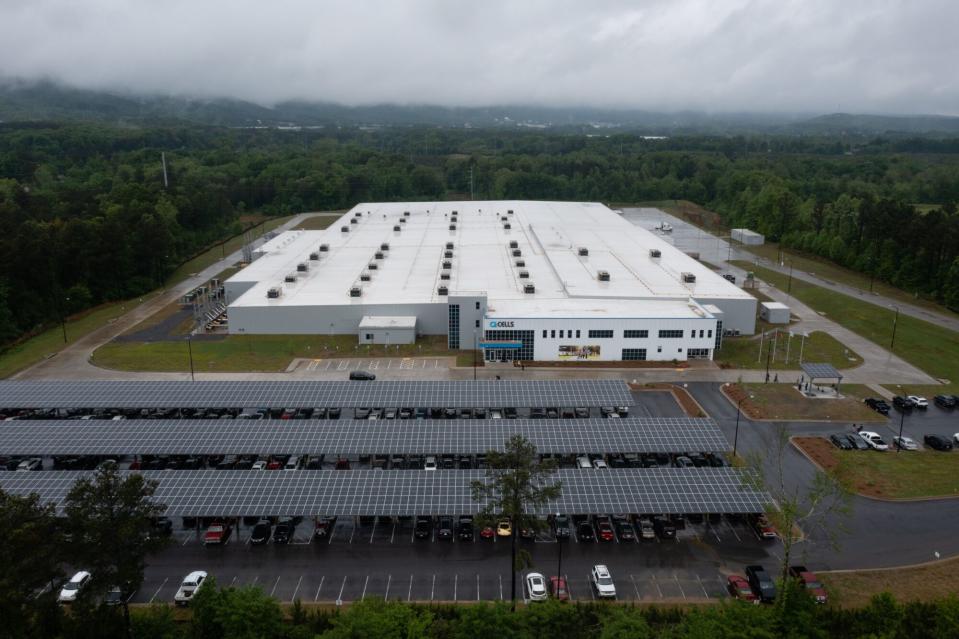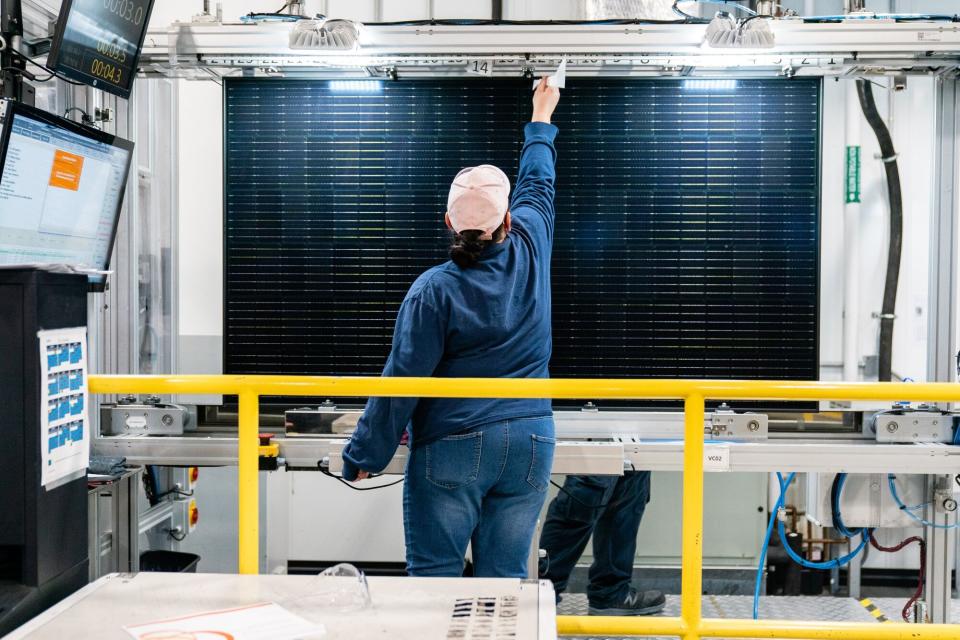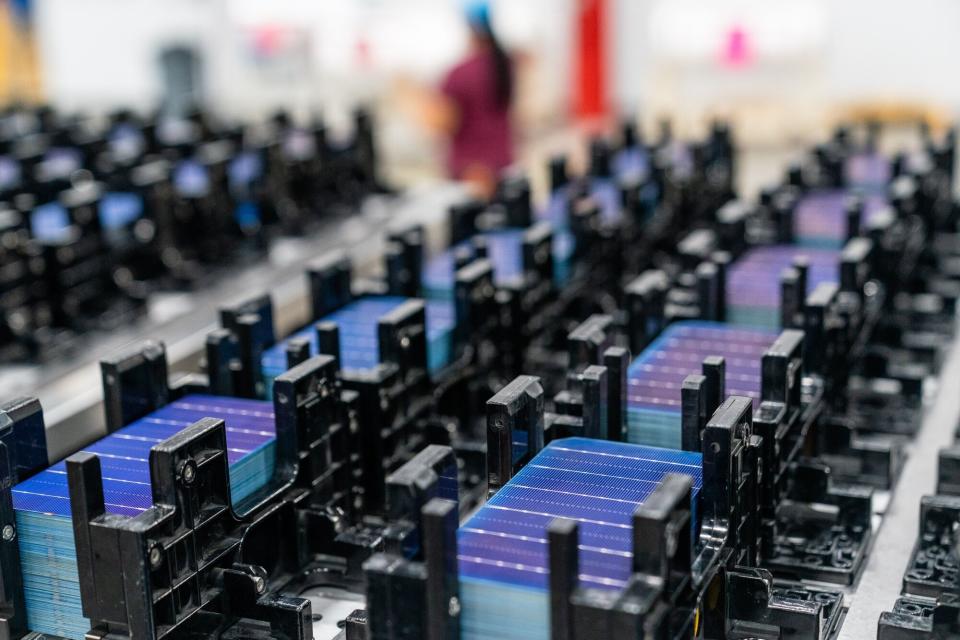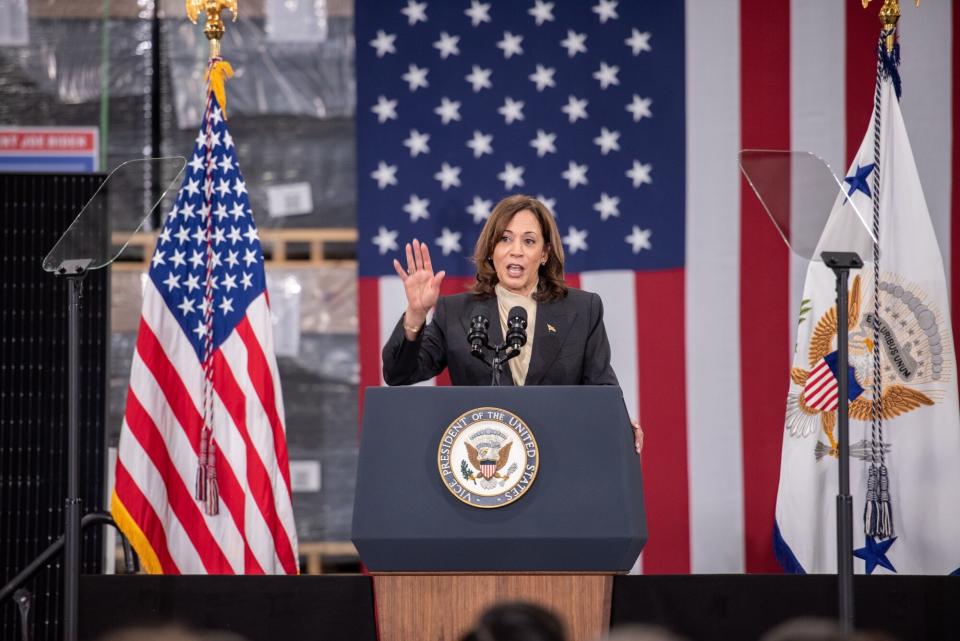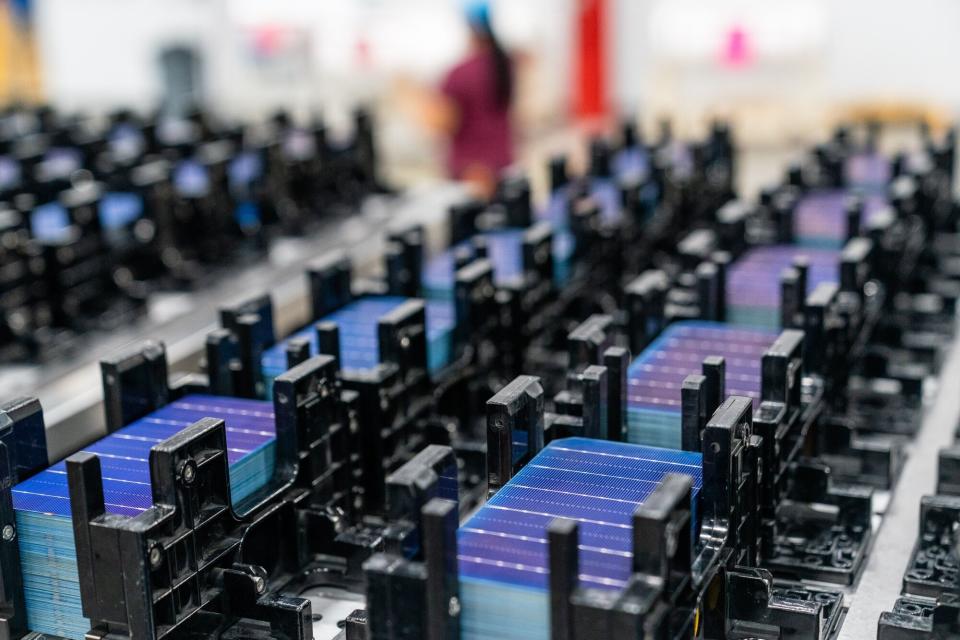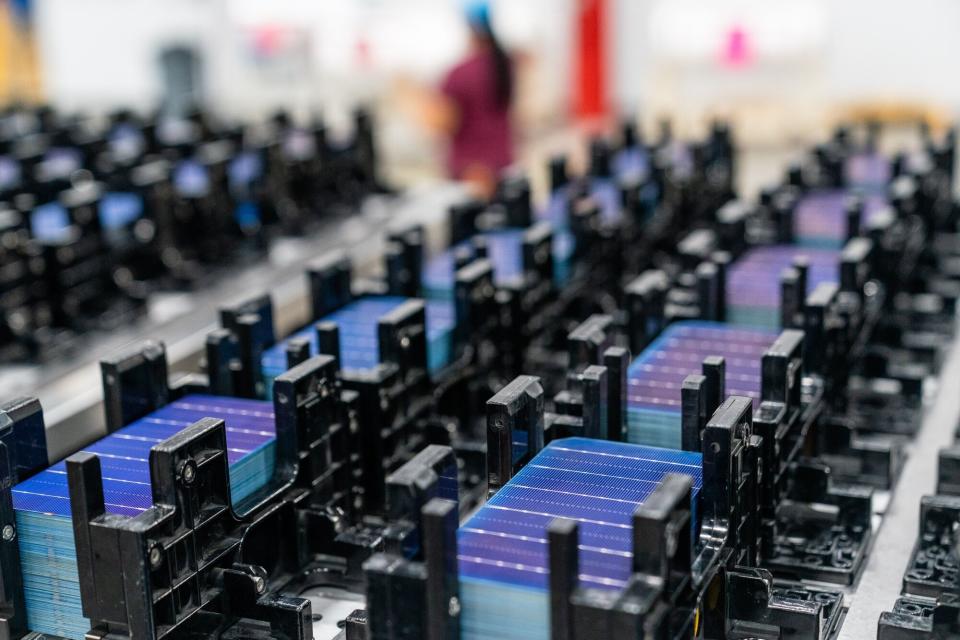Solar Firm Gets Millions in US Tax Credits Despite Chinese Labor Questions
(Bloomberg) -- A solar panel maker in Georgia that has booked $230 million in federal tax credits stands to collect hundreds of millions more as it pursues plans to create the first end-to-end solar manufacturing chain in the US, easing reliance on China and related concerns about the use of forced labor.
Most Read from Bloomberg
Saudis Warned G-7 Over Russia Seizures With Debt Sale Threat
The End of the Cheap Money Era Catches Up to Chelsea FC’s Owner
Microsoft Orders China Staff to Use iPhones for Work and Drop Android
NYC Penthouse Sells for $135 Million in Priciest Deal Since 2022
But at least through the end of this year, the Qcells solar plant, which South Korea’s Hanwha Solutions Corp. opened in Dalton, Georgia, in 2019 and almost doubled in capacity last year, is making panels with base components from China. And previously unreported Chinese filings show that two of Hanwha’s Chinese suppliers have received a portion of the polysilicon they used in such components from companies that appear on a list of sanctioned entities the US government designates as using forced labor. Those subsuppliers’ inputs are barred from entry into the US under federal law.
There’s no evidence that components containing the banned polysilicon have turned up in Qcells panels. Nonetheless, amid an industrywide scramble to comply with US import restrictions, questions persist about how well any solar-panel maker can police its supply chain in China. In the case of Qcells, which is key to the Biden administration’s plans to develop a fully onshore solar industry, the company offers assurances but no public details of its polysilicon sourcing, as some other manufacturers have provided to researchers.
Debra DeShong, vice president and head of corporate communications at Qcells, said the company requires its suppliers to provide inputs that are “compliant with US law.” It uses a robust approach, including affidavits, codes of conduct and traceability inspections to ensure that suppliers’ components for the American market and all others are free from forced labor, she said. DeShong added that Qcells, which plans to invest almost $3 billion in its US operations, halted using a third supplier for its US imports in 2021 and phased that firm out of its global supply chain in 2022 after it “failed to meet traceability standards.”
Still, some industry observers have called for increased scrutiny of the firm’s supply chain by US Customs and Border Protection officials, who are responsible for enforcing the import ban on goods linked to forced labor in western China’s Xinjiang region. The federal law is aimed at punishing China over its oppression of the Uyghur minority in Xinjiang, though Chinese officials deny any human rights violations and call their labor programs “poverty alleviation.”
“If a Qcells supplier or subsupplier is on the entity list, then to me it would be really strange for CBP not to look into Qcells” in connection with the import ban, said Bret Manley, executive director of the Energy Fair Trade Coalition, a nonprofit advocacy group that seeks to hold energy companies accountable to US trade and labor laws. The group doesn’t disclose its donors.
Qcells became the No. 1 provider of residential and commercial solar panels in the US, in part by supplying Tesla Inc.’s solar business. Its federal tax credits, awarded under the Inflation Reduction Act, may total billions of dollars over time: Qcells’ planned capacity at the Dalton plant and another in Cartersville, Georgia, indicates that it could receive more than $900 million worth for each year the act is in place, through 2032.
Under the Uyghur Forced Labor Prevention Act, or UFLPA, Customs officials have detained for inspection almost $3 billion worth of electronics products, mostly solar panels, since they began enforcing the ban in 2022. The agency declined to comment for this story. As a matter of practice, it doesn’t say which companies’ shipments it stops, but detentions of electronics jumped 186% in the first quarter of this year after complaints by members of Congress that the agency wasn’t doing enough.
On Tuesday, US Department of Homeland Security Secretary Alejandro Mayorkas announced that the agency will double the number of sectors it considers priorities for Customs inspections under UFLPA to include aluminum, seafood and polyvinyl chloride in addition to polysilicon, cotton and tomatoes. In an interview after the announcement, Mayorkas said companies get no points for trying to police their supply chains, only for successfully doing so. “One of the challenges is for companies to be able to really identify their supply chains,” he said without singling out any particular company. “What we need to communicate quite clearly is that this is not a statute that creates a safe harbor for a good faith effort. It is a strict liability statute in the sense that we will not allow goods made in whole or in part by forced labor, we will not allow them to enter the United States.”
No Qcells imports have surfaced among those known to have been stopped for inspection, according to five people in the solar industry who track detentions. Nor has South Korea — from which Qcells exports the bulk of its components after processing Chinese wafers into photovoltaic cells — been singled out on a countries-of-origin list published by Customs officials.
The US law created challenges for solar manufacturers because of China’s dominance of the solar supply chain. The US State Department has warned that metallurgical grade silicon from China, used to make polysilicon, carries an implicit risk that the material has been mixed from multiple sources, including Xinjiang. China produces about 80% of the world’s polysilicon, and about one-third of China’s capacity is in Xinjiang, according to BloombergNEF.
As the US import ban took effect, major Chinese solar companies began switching to more expensive polysilicon from Western countries to eliminate that risk. Yet the most recent supply agreements and disclosures from Hanwha’s top two wafer suppliers show their polysilicon comes from China.
Hanwha does not disclose details of its supply chain or procurement of raw materials, citing “commercial competition and trade secrets concerns.” It said it discloses only to third parties who agree to keep the information confidential. That lack of disclosure and information about Hanwha’s known suppliers led researchers at the UK’s Sheffield Hallam University, who have produced two reports on forced labor and the solar industry, to conclude last year that Qcells presented a “very high risk” of using polysilicon tied to forced labor.
The Customs agency in February sent a 19-page questionnaire to solar importers asking about their supply chains and requesting that they “document internal controls, policies and procedures which ensure that raw materials used in production by your company do not contain inputs produced with forced labor at any level of the supply chain.” Qcells said it has responded with details of its materials’ procurement and has “worked with federal, state and local authorities to ensure that we meet regulatory requirements.”
One question on the Customs form asks whether manufacturers or their suppliers have ever sourced materials “from entities identified as using forced labor.” Chinese filings indicate that Hanwha’s suppliers have. The company’s two primary Chinese suppliers, TCL Zhonghuan Renewable Energy Technology Co. and Gokin Solar Co., make the wafers used for the photovoltaic cells that Hanwha manufactures in Korea and then Qcells imports for its panels in Georgia.
TCL Zhonghuan, part of TCL Technology Group Corp., which is known for making televisions and panel displays, had an agreement to receive polysilicon from Daqo New Energy Corp. from 2021 through 2023. For most of that time frame, Daqo’s sole producer of polysilicon was its Xinjiang unit, which US officials sanctioned in June 2021 for using forced labor. A representative for Shanghai-based Daqo said in an email that only its Xinjiang subsidiary is subject to the sanction under UFLPA.
TCL Zhonghuan also received polysilicon from a second sanctioned entity. Last year, it received $316 million worth of the material from its own joint venture with GCL Technology Holdings Ltd., the company’s largest single provider. That venture was added to the US sanctions list in June 2021. TCL Zhonghuan, which exited its stake in December, didn't respond to a request for comment. A GCL spokesperson confirmed the supply yet disputed its unit’s inclusion on the UFLPA Entity List, saying GCL has a "zero-tolerance attitude toward human rights violations such as forced labor."
Gokin Solar’s June 2023 prospectus for an initial public offering on the Shenzhen Stock Exchange shows that at least one-third of its polysilicon supply that year originated in Xinjiang — from Xinjiang Daqo, the sanctioned entity, and from another supplier, Xinjiang Xinte Crystal Silicon Hightech Co. (Although Xinjiang Xinte doesn’t appear on entity list, the UFLPA bans any material from Xinjiang from importation into the US.) Neither Gokin nor Xinjiang Xinte responded to requests for comment.
The supplier that Hanwha stopped using, Jiangsu Meike Solar Technology Co., also had polysilicon supply agreements with both Xinjiang Daqo and GCL’s sanctioned unit. Its IPO prospectus on the Shenzhen exchange said Hanwha was its largest customer at 64% of its accounts receivable in 2021, totaling $15.8 million. By 2022, the amount dropped to $875,000. A spokesperson for Meike said the company stopped sourcing from Xinjiang in 2023.
Qcells’ DeShong said Hanwha has no authority over where its suppliers get the polysilicon they use for other customers. The company requires suppliers to confirm in affidavits that their “manufacturing locations” aren’t located in the Xinjiang region and that “forced labor is not used to produce goods supplied to Qcells,” she said. “Third-party diligence experts conduct on-site segregation and traceability inspections.”
Relying on supply-chain audits to root out forced labor in China is problematic, according to Jim Wormington, a senior researcher at Human Rights Watch, who testified at an April hearing of the Congressional-Executive Commission on China. Such audits, he said, are “constrained by the threat of Chinese government reprisals against auditors or their sources, creating obstacles for auditors.” Beyond that, Wormington noted, Chinese laws prohibit companies from complying with US sanctions, further limiting audits’ effectiveness.
“Although this legislation has been deployed in only limited ways to date, it creates genuine risk for foreign companies in China,” said Keith Hand, a professor and director of East Asian Legal Studies at University of California, San Francisco. “Many US multinationals are caught in the crosshairs.”
Qcells’ near-term reliance on Chinese suppliers reflects global conditions. DeShong said that because 99% of solar wafers are manufactured in China or by Chinese-owned companies, it’s “nearly impossible” to operate without some connection to Chinese suppliers. She added: “Qcells is the only supplier in the world working to change that entirely.”
Qcells started out as a German company and was purchased out of bankruptcy in 2012 by Hanwha Group, Korea’s eighth-largest conglomerate by annual revenue. Hanwha itself began as an explosives maker in 1952; it has since expanded to include chemicals, shipbuilding, construction, aerospace, finance, hotels and retail, as well as Hanwha Solutions, its solar manufacturing unit.
Qcells promises to reduce reliance on China and create 4,000 US jobs by establishing a domestic solar supply chain. Beginning next year, the company says it expects to have as much as 8.4 gigawatts of productive capacity at its Georgia plants, with Cartersville producing its own wafers in addition to panels. Qcells also has invested in restarting polysilicon production at a facility in Moses Lake, Washington, though it will have to be supplemented with imported material from South Korea, the company said.
The White House has trumpeted these goals. “It will bring back our supply chains, so we aren’t reliant on other countries, lower the cost of clean energy, and help us combat the climate crisis,” Biden said in a January 2023 statement when the company announced its plans for expansion and additional investment. “And it will ensure that we manufacture cutting-edge solar technology here at home.” Vice President Kamala Harris visited the Dalton plant in conjunction with the announcement.
The following month, Qcells hired Danny O’Brien, who had been chief of staff in Biden’s Senate office from 2003 to 2006, as its head of government relations. Qcells disclosures in the last three months of 2023 show $530,000 in lobbying expenditures on issues including the IRA, which was passed in 2022. By comparison, First Solar Inc., its US-based rival, spent $280,000 on lobbying in that period.
The legislation, which Congress passed eight months after the import ban on goods tied to China’s Xinjiang region, seeks to create incentives for manufacturers to reduce reliance on China by creating green-energy supply chains in the US. But it lacks any provisions that would ensure imported components for assembly in the US are free of forced labor. Instead, it incentivizes such steps as using union labor and creating employment in rural communities, according to guidelines from the US Treasury Department, which administers the program.
Senator Jon Ossoff, a Georgia Democrat, was an architect of the solar manufacturing incentives incorporated into the IRA legislation. He has said that creating such a supply chain in the US and reducing dependence on China is crucial to energy independence and national security. His office didn’t respond to a request for comment.
In a larger context, China’s continued dominance of the solar industry may mean that billions of dollars in IRA tax credits will be awarded to Chinese companies, according to the Coalition for a Prosperous America, which represents US-based solar manufacturers. The group estimates that $125 billion in credits could end up with Chinese firms seeking to set up factories in the US, and it argues that would defeat the law’s intention.
“That’s got to be a concern for policymakers,” said Nick Iacovella, the coalition’s head of public affairs and a former staffer for Senator Marco Rubio, a Florida Republican who co-authored the import ban on goods tied to Xinjiang. “The last thing anybody wants is for Chinese companies to benefit from the IRA,” he said.
--With assistance from Heesu Lee.
(Updates with additional detail about the reach of Qcells’ anti-forced-labor compliance program in fourth paragraph and comments from Homeland Security Secretary Alejandro Mayorkas in ninth paragraph)
Most Read from Bloomberg Businessweek
At SpaceX, Elon Musk’s Own Brand of Cancel Culture Is Thriving
Family Offices of the Ultra-Rich Shed Privacy With Activist Bets
©2024 Bloomberg L.P.

 Yahoo Finance
Yahoo Finance 